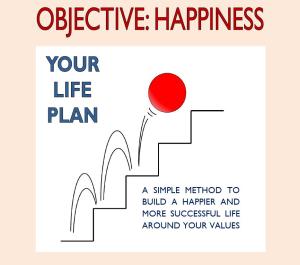Your level of happiness or fulfillment is generally a direct consequence of how much you live your life and live in an environment that matches your values.
Here at The Happy Future Group, we have developed our Life Plan program (see the presentation under “Personal Programs“) to help you identify how balanced your life and your values are, and from there we help you build your own specific action list.
The process is simple. To identify your values, you will confront your own findings with some of your friends’ assessment of what truly drives you. Involving trusted friends to participate makes this process more fun and more rewarding. It also avoids this search to feel like a questioning, and at the same time, it will give you a much more objective feedback. After all, every person is who they really are, but also whom they show and who others think they are. By reducing the discrepancy between these three apparently different persons, your level of happiness will naturally increase.
By assessing how much fulfillment the different parts of your life match your core values, you will get your own “fulfillment index”. From that index and its analysis, it will become rather easy and obvious what actions you will need to take to increase your level of fulfillment.
The philosophy of the action list is all about incremental improvement. Consider your current life as being the ground zero. Each action when completed will help you live more to your values, and therefore you will achieve progress one step at a time. The timelines are the ones you feel comfortable with. All you need is to fully commit to the process. Should you “soften” a bit, we will help you remember what you promised yourself to achieve.
All you need to complete this process to success is to have the willingness to make it work, to be yourself and to spend the necessary time and energy.
To be happy, you do not need to go up the mountain to find yourself. It is all here and now, inside and around you!
Copyright 2009 The Happy Future Group Consulting Ltd.



 Posted by Christophe Pelletier
Posted by Christophe Pelletier  Customers are essential for a business. Therefore, keeping the customer satisfied and happy is critical for you as a supplier. So, what does make a happy customer? Is it just about saying “yes” to all their requests? Although many salespeople seem to think that saying “yes” is the answer, the reality is quite different. Customers understand and accept “no” for an answer when they realize that they can have a better deal than “yes”.
Customers are essential for a business. Therefore, keeping the customer satisfied and happy is critical for you as a supplier. So, what does make a happy customer? Is it just about saying “yes” to all their requests? Although many salespeople seem to think that saying “yes” is the answer, the reality is quite different. Customers understand and accept “no” for an answer when they realize that they can have a better deal than “yes”. When hiring people, I have heard many times their claiming to be perfectionists, either as one of their top three qualities or one of their top three “weaknesses”. Actually, it has always sounded to me like everyone wants things to be “perfect” all the time.
When hiring people, I have heard many times their claiming to be perfectionists, either as one of their top three qualities or one of their top three “weaknesses”. Actually, it has always sounded to me like everyone wants things to be “perfect” all the time. Yet, a satisfied and happy boss is very important for an organization, because the boss’s personality and mood is quite contagious. You can be sure that a bitter boss means lots of bitterness and tension on the work floor. Therefore, a happy boss is an absolute necessity in order for a company to achieve superior performance.
Yet, a satisfied and happy boss is very important for an organization, because the boss’s personality and mood is quite contagious. You can be sure that a bitter boss means lots of bitterness and tension on the work floor. Therefore, a happy boss is an absolute necessity in order for a company to achieve superior performance. The best way to achieve this is to make a short plan of the activities you want to be done before the end of the day. Remember that failing to plan is planning to fail.
The best way to achieve this is to make a short plan of the activities you want to be done before the end of the day. Remember that failing to plan is planning to fail. A famous example of presence for a leader is the battle of the bridge of Arcola. Napoleon was still a young general and the battle against the Austrians was not going too well. The story is that Napoleon took the flag and led his troops marching on the bridge, dodging bullets. This reportedly boosted his army’s spirits; they followed him on the bridge for the direct confrontation with the enemy. The result was a strategic victory. Even though this story seems to have been embellished, as Napoleon might not have acted as heroically as the story states, it certainly has established his leadership position and it created a strong mystique about his persona.
A famous example of presence for a leader is the battle of the bridge of Arcola. Napoleon was still a young general and the battle against the Austrians was not going too well. The story is that Napoleon took the flag and led his troops marching on the bridge, dodging bullets. This reportedly boosted his army’s spirits; they followed him on the bridge for the direct confrontation with the enemy. The result was a strategic victory. Even though this story seems to have been embellished, as Napoleon might not have acted as heroically as the story states, it certainly has established his leadership position and it created a strong mystique about his persona. I have spent a long part of my career in industries dealing with perishable products. Per definition, such products cannot be stored for very long and this makes the business dynamics quite intense, and often stressful, as “everything must go” and for a profit, mind you. Therefore, my assignment to them, next to (or I should say as part of) doing the job was to make me hear some laughter. It did not matter what the reason would be, as long as there would be fun. In that line of work, we were lucky to be able to find many reasons to laugh because we were dealing with colorful characters and we could easily find the funny absurdities of the business. The head office would involuntarily also provide for much material to us as well. If my staff would not laugh frequently enough to my liking, I would pop in and bring some craziness of my own to help them out.
I have spent a long part of my career in industries dealing with perishable products. Per definition, such products cannot be stored for very long and this makes the business dynamics quite intense, and often stressful, as “everything must go” and for a profit, mind you. Therefore, my assignment to them, next to (or I should say as part of) doing the job was to make me hear some laughter. It did not matter what the reason would be, as long as there would be fun. In that line of work, we were lucky to be able to find many reasons to laugh because we were dealing with colorful characters and we could easily find the funny absurdities of the business. The head office would involuntarily also provide for much material to us as well. If my staff would not laugh frequently enough to my liking, I would pop in and bring some craziness of my own to help them out. It is rather easy to sort people in either one of these two groups. They have very specific and very different behaviors.
It is rather easy to sort people in either one of these two groups. They have very specific and very different behaviors. Empathy is one of those qualities that is acknowledged as being important, but for which there is little training given. One reason probably is that empathy, like some other personality traits, one is born with it more than one can learn it. Yet, there are certain patterns that can be acquired and help people interact with their fellow men better.
Empathy is one of those qualities that is acknowledged as being important, but for which there is little training given. One reason probably is that empathy, like some other personality traits, one is born with it more than one can learn it. Yet, there are certain patterns that can be acquired and help people interact with their fellow men better.
 Properly handling customer complaints is actually one of the most powerful ways of creating loyalty. Similarly, poor handling will guarantee your company bad publicity and a poor reputation.
Properly handling customer complaints is actually one of the most powerful ways of creating loyalty. Similarly, poor handling will guarantee your company bad publicity and a poor reputation. This way, you will win his loyalty.
This way, you will win his loyalty.









